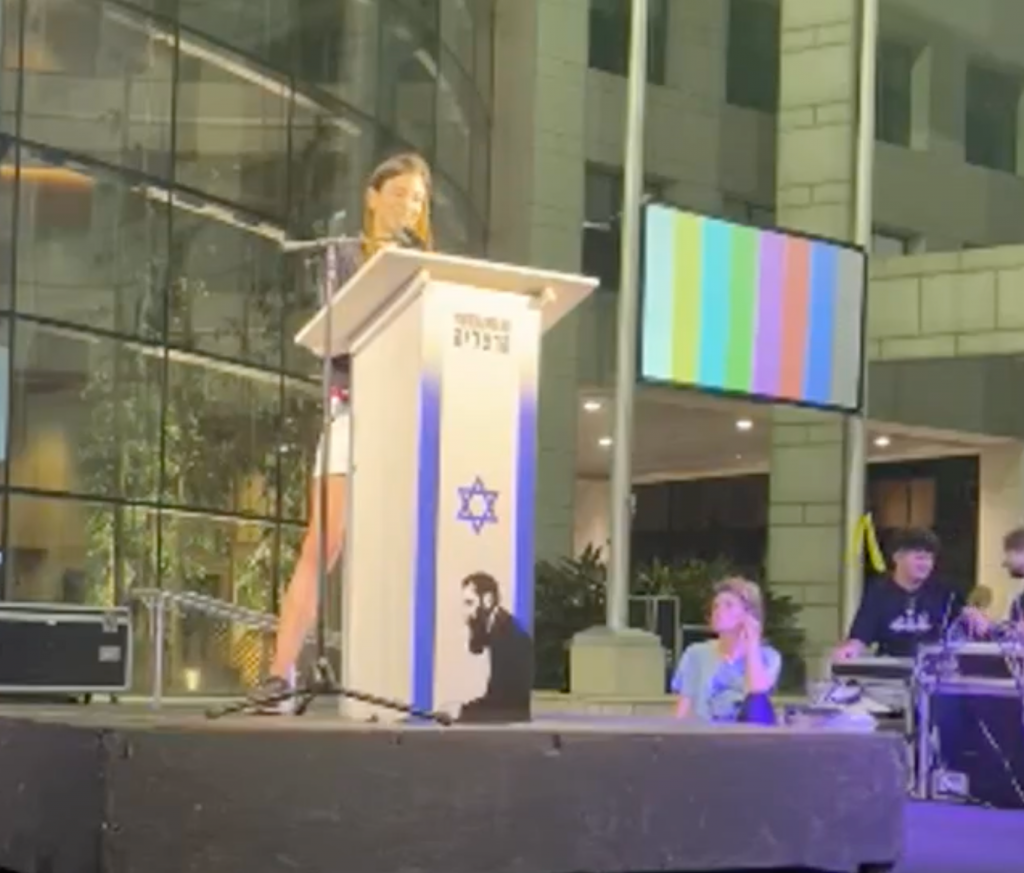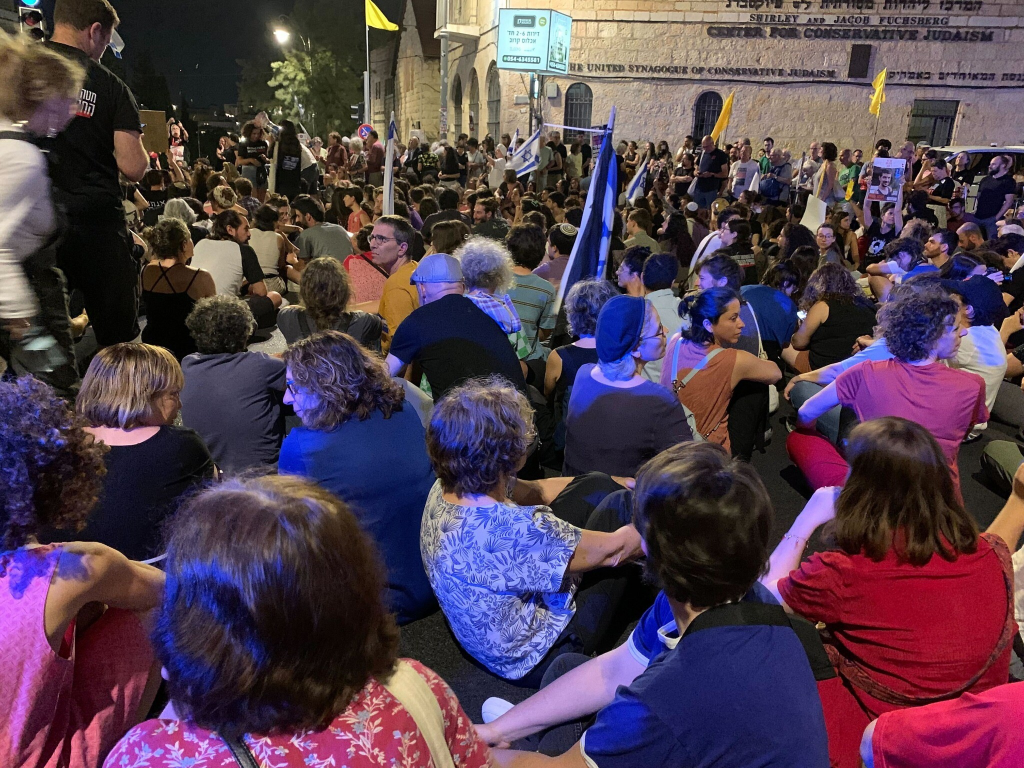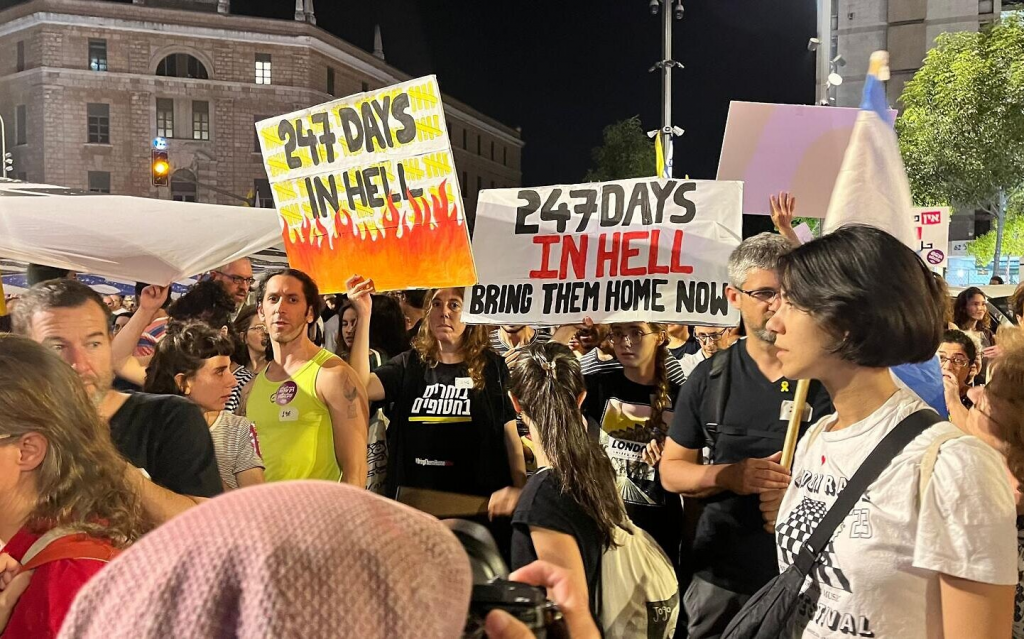Tel Aviv police disperse crowd with water cannon; rallies also held in Jerusalem, Caesarea, Herzliya; Netanyahu slammed for only visiting rescued captives, ignoring grieving families

Protesters at rallies in Tel Aviv and across the country on Saturday night called for new elections and the return of the hostages held in captivity in Gaza, hours after the military announced that four hostages were rescued alive from central Gaza’s Nuseirat camp.
While joy over the rescue of Noa Argamani, Shlomo Ziv, Almog Meir Jan and Andrey Kozlov was evident at the protests, so too was anger over the conduct of Prime Minister Benjamin Netanyahu and his government.
In Tel Aviv, police said that 33 protesters were arrested during demonstrations and that all roads near the protests were opened to traffic around midnight.
Although most demonstrators attended the pre-approved rally and then dispersed, some stayed and marched along Begin and Kaplan roads, “while trying to block a traffic route,” police said in a statement.
“Police forces at the scene dispersed the protesters from the road, while employing riot control methods and arresting disrupters of public order,” the statement said.
Some people were arrested after several skirmishes broke out between police and protesters as they attempted to march toward Ayalon Highway despite the roadblocks, setting off fireworks as they went.

The protesters were apprehended by police on horseback before a water cannon was brought in to aid in their dispersal.
The Times of Israel witnessed several arrests in which police tackled demonstrators to the ground. At the same time, police on horseback were seen pushing protesters off of Democracy Square and onto the sidewalk on Kaplan Street.
Speaking on the main stage of an anti-government demonstration in Tel Aviv, former IDF intelligence chief Amos Malka called the rescue mission “an incredible operational success in a sea of strategic failures,” describing it as having been more complex than Operation Entebbe, which saw the release of over 100 Israeli hostages in Uganda in 1976.
He also criticized the prime minister for rushing to meet and be photographed with released hostages and their families after not having contacted the families of hostages who were killed in captivity, including the families of Nadav Popplewell, Amiram Cooper, Yoram Metzger and Haim Peri, whose deaths were announced by the IDF earlier this week.
“We’re losing everything, crops are being burnt, tourism is collapsing, the small businesses that are still operating are collapsing, and worst of all, our communities are collapsing,” said Reut Forstner Avraham, an activist and resident of Israel’s bombarded north.

Several demonstrators holding signs in praise of the government attempted to break into the crowd but were rebuffed and shoved away.
As the demonstration ended, attendees dispersed to join the nearby protest in support of a hostage deal.
Meanwhile, at a rally outside of Herzliya city hall, anti-government protest leader Nava Rozolyo thanked IDF Chief of Staff Herzi Halevi and Shin Bet head Ronen Bar, along with the Israel Police and security forces, for the rescue of the four hostages in a daring operation on Saturday morning.
She then turned her wrath on the government, starting with war cabinet minister Benny Gantz, who canceled a planned press conference on Saturday evening, in which he was expected to announce that he was leaving the government.
“For the thousandth time, Benny Gantz is not doing what he said he’d do,” said Rozolyo, a lawyer who has been one of the activists leading the protests against the government.

She compared Gantz to the protagonist from the Dutch legend of a boy who saves his country by plugging a leaking dike with his finger, popularized by the 19th-century book “Hans Brinker.”
“He joined the disastrous government,” said Rozolyo. “We’re not in the Netherlands and we have been calling to him for months — he won’t save the village, he didn’t prevent anything in the last eight months, in any area.”
Calling for the public to take to the streets to steer the country back in the right direction,” Rozolyo said that if they don’t, “disaster will follow disaster,” and the current government “will destroy the Zionist dream and all we accomplished in the last 76 years.”
“Everyone needs to rise and go to the bridges and town squares and roads and the capital, and we’ll yell across from the Knesset, go, go, go!” She said. “We’ll make sure he hears.”
In Tel Aviv, family members of hostages spoke one after the other on Azrieli Bridge over Begin Road to urge protesters to continue to show up in full force, stressing that the rescued hostages had said they were aware of the protests calling for their release throughout their eight months of captivity.

Among the speakers at the rally urging the government to finalize a deal for the release of the remaining hostages was Ayala Metzger, whose father-in-law Yoram Metzger was among four hostages confirmed by the IDF on Monday to have been killed in Hamas captivity.
Several family members also expressed concern that Saturday’s successful rescue mission could negatively influence the conditions in which the remaining hostages are held, further emphasizing the urgent need for a deal.
Following the rescue mission, 116 of the 251 hostages abducted by Hamas on October 7 still remain in Gaza, not all of them alive. A weeklong truce in late November saw 105 civilians released from Hamas captivity and four hostages were released before that.

Similar, smaller protests took place across the country on Saturday evening, including in Jerusalem, where large photos of Popplewell, Cooper, Metzger and Peri were displayed over the central stage.
“They were alive, and because of the government and this failure of a cabinet they are not here, and not alive,” said Tom Barkai, a relative of Peri and a central organizer of the weekly Jerusalem rallies.
After speeches ended in Paris Square, hundreds of protesters blocked the intersection outside the prime minister’s residence, sitting down in the middle of the road while chanting slogans in support of a hostage deal and against the ongoing war in Gaza.
The mass act of civil disobedience caught law enforcement by surprise, with organizers having led the general public to believe that a march to Independence Park would follow the speeches.

“We don’t want more killings, this is the time for agreements!” demonstrators shouted. After about 20 minutes of sitting, they stood up and continued their march to Independence Park.
Protesters tried to march past the park once reaching it, but were stopped by police, so the group turned tail and made a break for King George Street in the center of the city. The protest quickly thinned out from there on out, and eventually ended in Zion Square. Police brought out a water cannon, though they never used it on the demonstrators.
The Times of Israel witnessed police detain one demonstrator who, along with some dozen others, attempted to block the tracks of the Jerusalem light rail.

Protesters also convened in Netanyahu’s hometown of Caesarea to call for early elections and a deal to release the remaining hostages.
In southern Israel, several dozen people gathered in the desert town of Mitzpe Ramon, while thousands marched up north in Haifa.
Also up north, protesters blocked traffic at key intersections in protests against the government’s policy regarding ongoing Hezbollah attacks, which have resulted in eight months of internal displacement for tens of thousands of people.
At Karkur Junction, a convoy of tractors joined a group of protesters who were shoved off the road by police officers for blocking traffic, while at Amiad Junction, protesters and evacuated residents blocked traffic with bales of hay and other crops, demanding to know when they would be able to return home.
The hostages were taken during Hamas’s October 7 massacre, which saw some 3,000 terrorists burst across the border into Israel by land, air and sea, killing some 1,200 people, seizing 251 hostages, mostly civilians, and perpetrating many acts of brutality and sexual assault.
As reported by The Times of Israel
